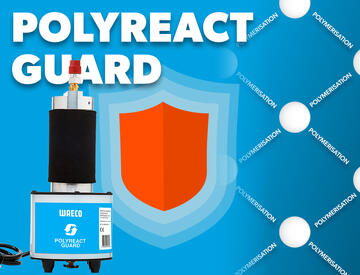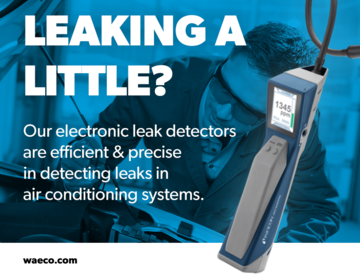Special report air conditioning know-how
Idemitsu Kosan Co. Ltd. is a Japanese mineral oil company that owns and operates oil platforms and refineries, and produces and sells mineral oil, oil and other petrochemical products.
As a well established specialist in mineral oil based lubricants, Idemitsu ranks as the world’s leading manufacturer of PAG oils for vehicle air conditioning systems. With its so called double end capped PAG oils, Idemitsu supplies almost all manufacturers of first-fill A/C compressors, e.g. Denso and Sanden.
Wishing to ensure its high quality standards even beyond the first fill, Idemitsu was also considering the question of what happens to the compressor oil when the air conditioning system is serviced or repaired.
PAG oils are by nature hygroscopic. That means they quickly absorb moisture. What used to be tolerable for R 134a A/C systems now turns out to be a real problem, because R 1234yf is much more sensitive in interaction with oil and water.
When producing original oils, Idemitsu applies a great deal of technical effort to meet the quality standards of the compressor manufacturers and the automotive industry. In this way Idemitsu wants to ensure that the precious oils cannot absorb moisture from the ambient air during production, charging and storage.
There are also defined standards for the professional repair of vehicle air conditioning systems. German manufacturers, for instance, are defining specific requirements in their specifications for A/C service units. Specifications for R 1234yf A/C service units say that A/C compressor oils may only be injected into vehicle air conditioning systems from refillable and moisture-free containers.
Technically speaking, this is a contradiction in itself, because refilling a container always involves the risk of air intake – and thus the risk of moisture penetration. To make this contradiction visible, the company recommended conducting a scientific study. The purpose of this study was to find out if the commonly available fresh oil containers for A/C service units are really tight enough to keep the moisture contained in the ambient air out.
Experimental setup
The test run was performed by a renowned manufacturer of A/C service units in an independent institute. Test conditions were a temperature of 40°C and a relative humidity of 60%.
The testers examined the containers of five different manufacturers as well as a simple glass container (Erlenmeyer flask) serving as a neutral reference. All containers were filled with the same amount of the same PAG. PAG (without additional UV additives) is a clear, colorless liquid and unlike e.g. engine oil it does not change colour during the working process under suitable conditions.
The proportion of moisture contained in the oil was measured at the beginning (initial value), after three days as well as after seven and fourteen days.
Results of the test run
| Water content in ppm after days | |||
| 3 | 7 | 14 | |
| Manufacturer 1 | 2840 | 4336 | 6124 |
| Manufacturer 2 | 614 | 723 | 1342 |
| Manufacturer 3 | 2487 | 4617 | 6204 |
| Manufacturer 4 | 3461 | 5189 | 6085 |
| Manufacturer 5 | 114 | 143 | 158 |
| Erlenmeyer flask | 3158 | 5611 | 7227 |
| Warning value | 800 | 800 | 800 |
Test evaluation
In four of the five containers the moisture content in the oil was above the maximum permissible limit (800 ppm in our test) already after three days.
How does the water get into the oil?
PAG oil literally attracts water. A leaky closure or an unsuitable container material is enough to let the PAG oil absorb moisture from the ambient air. So called vapour-tight containers are used to avoid this effect.
Why is moisture absorption a problem?
The thermo-chemical stability of the refrigerant/oil blend is critical for the reliability of the air conditioning system. The chemical properties of the blend should also remain stable when temperature fluctuations occur in a defined temperature range, i.e., the chemical structure of the blend should not change. Said thermo-chemical stability is at risk if moisture (water) comes in. If refrigerant, oil and water react with one another, this can lead to the formation of acids or slurries. Acids damage the components of the A/C system and cause problems in the refrigerant circuit, e.g. corrosion of the compressor. These reactions occur significantly more quickly if the system contains more than 800 ppm of water. R 1234yf is significantly more sensitive in this respect than R 134a.
Depending on the quality of the oil used, the moistened oil already at 1000 ppm shows a considerably higher acid value after the thermo-chemical ageing.
The lubricant shows a significant change in the colour value; and there are also visible changes on the metal coupons.
What is more, the increased humidity can impair the lubricating properties of the oil. This, in turn, reduces the lifetime of the A/C components. Insufficient lubrication is the second most common cause of compressor damage! The results are the breakdown of the air conditioning system, costly repairs or time-consuming processing of complaints.
When it comes to the maintenance and repair of vehicle air conditioning systems, Idemitsu recommends using a high-quality, chemically and thermally stable Daphne Hermetic Double End Capped oil in original quality – one that is stored in an effectively vapour-tight container and injected into the A/C system without getting in touch with the ambient air.







